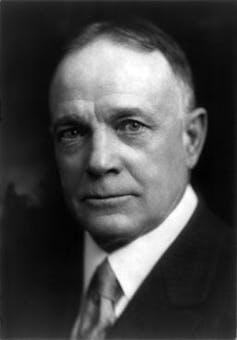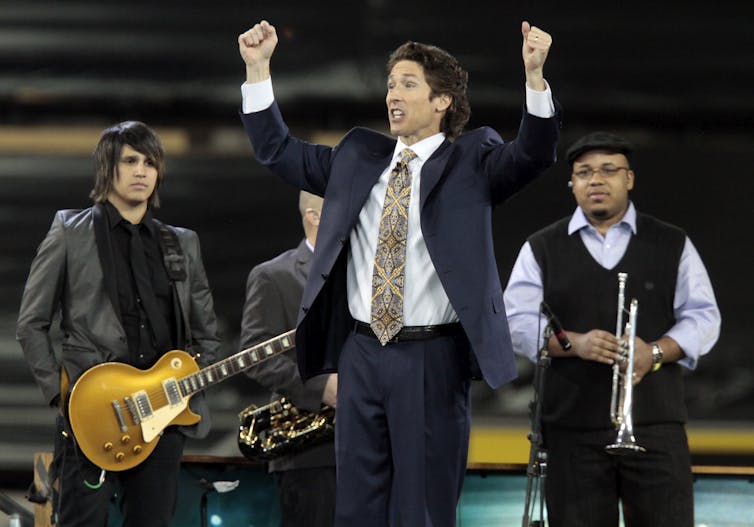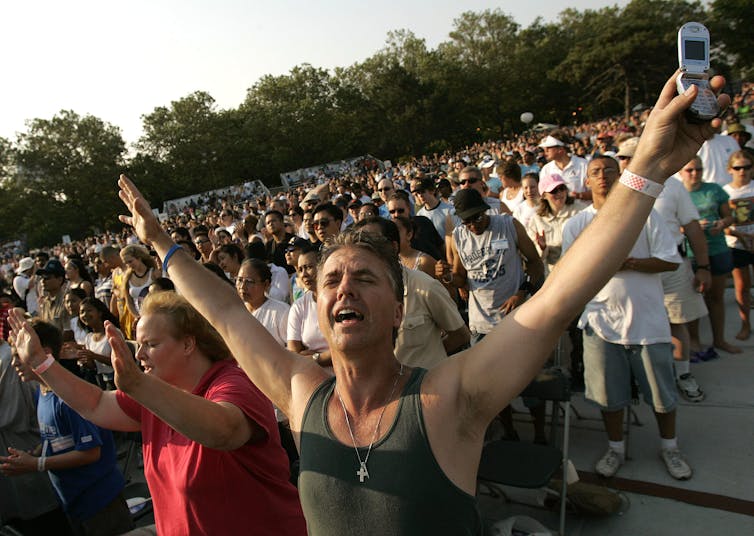Could there be another Billy Graham?
Current trends suggest that evangelicalism is out of step with younger Americans. But, a scholar says, evangelicalism has been here before.

At this time of Billy Graham’s passing, American evangelical Christianity looks to be in steep decline, at least judging by numbers. The proportion of white Americans who identify as evangelical has fallen from 23 percent of the population in 2006 to 17 percent in 2016. Furthermore, a recent survey shows that evangelicalism is aging: Only 8 percent of whites ages 18 to 29, versus 26 percent over 65, identify as evangelicals.

Current trends, then, suggest that the evangelicalism of the future will be smaller, grayer, more closely identified with the Republican Party, and more out of step with the views of younger Americans than it is at present. It might seem that Billy Graham is the last nonpartisan evangelical. But as one who teaches the history of evangelicalism, I can imagine different possibilities.
In 1935 the premier magazine of liberal Protestantism, the Christian Century, called the famous early 20th-century revivalist Billy Sunday “the last of his line.” But less than 20 years later, Billy Graham would lead evangelicalism to revival.
In a way, evangelicalism has been here before.
What facilitated Graham’s rise
Graham rose to prominence in the post-World War II period as the public face of what scholars describe as “neo-evangelicalism.”

The historian of religion Joel Carpenter describes neo-evangelicalism as the vision of a number of prominent religious leaders who wanted to create a form of conservative Protestantism that could escape from the long shadow of fundamentalism.
In 1925 fundamentalists succeeded in passing a law in Tennessee banning the teaching of evolution in public schools. That same year the young teacher, John Scopes, was prosecuted for teaching evolution in the famous Scopes “monkey trial.” Since then, “fundamentalism” had become synonymous with intolerance and anti-intellectualism.
However, as the Congregationalist minister Harold Ockenga put it, a new generation wanted to create “a progressive fundamentalism with an ethical message.”
Graham, already a rising star, was soon adopted as the right man to represent the new “evangelicalism.” Over time, as described by his close associate A. Larry Ross, Graham became the closest thing to an official spokesman for this movement.
It is true that Graham did not single-handedly rescue evangelicalism from fundamentalism, but his contribution remains unmatched.
The question now is whether a repeat of the neo-evangelical project possible – could there be another Billy Graham?
Factors today
Graham’s success was enabled by the conditions of his day. And there are similarities between his day and ours.
First and perhaps most importantly, evangelicalism has an image problem comparable to that of earlier fundamentalism: Large numbers of Americans, particularly younger ones, regard evangelicalism as simply un-Christian. Evangelicalism, in other words, is ripe for revival.
Second, Graham had backers among the established religious leaders of his day. Today too there are pastors and authors – such as Rick Warren, T. D. Jakes and Joel Osteen – who have large followings and good reputations. They might unite behind a rising star, as Ockenga and others did behind Graham.

And third, Graham benefited significantly from business interests who backed his free-market message. If anything, the links between conservative Protestantism and corporate capitalism have only strengthened in recent decades.
A prospective successor to Graham could probably count on support from the business sector so long as he or she stayed away from sensitive topics like economic inequality.
What stops the rise of evangelicalism
But on the other hand, consider what has been happening of late to once-prominent evangelical leaders who have suggested that evangelicalism does not have to be as fundamentalist or as wedded to social and political conservatism as it has sometimes been.
I have in mind figures who want to be recognizably centrist evangelicals, not those who clearly belong to the small but persistent “evangelical left.” A rather large number of this first group are now, publicly, “former” evangelicals.
Take the case of David Gushee, author of “Still Christian: Following Jesus Out of American Evangelicalism.” Gushee converted to evangelical Christianity in 1978 and has had a distinguished career as an evangelical Christian ethicist. But tensions arose when he began publicly addressing issues like climate change and torture.
The event that triggered his departure from evangelism was his public embrace of same-sex relationships. On the day the news broke, Gushee recalls, “My phone, as the kids say, blew up.”
Alongside expressions of support and appreciation he received a flood of rejections via the entire range of contemporary media, including, as he explains:
“anonymous letters in the mail with lots of vile photocopied materials, angry e-mails, Facebook posts and direct messages, tweets, critical reviews, invitations to debate, Twitter bomb attacks when I refused to debate.”
Shortly afterwards, the “disinvitations” started: scheduled speaking engagements canceled, a revised edition of a book pulled, and on and on. Four months later Gushee realized that he had “left an entire world behind.” It is not clear whether Gushee chose to leave evangelicalism or whether he was pushed out.
Many other former evangelicals have similar stories. Among these are Rob Bell, the author of “Love Wins,” the controversial book that questioned common evangelical positions on hell; Brian McLaren, the intellectual force behind “the emerging church,” a once-promising movement of renewal among younger evangelicals; and prominent bloggers and authors Rachel Held Evans and Jen Hatmaker.
At one time these were all regarded as bright lights of younger evangelicalism. All of them have tried to moderate those aspects of evangelicalism that are responsible for its generally poor reputation in American society at large. And all of them, after attracting significant amounts of criticism from their fellow evangelicals, have moved on from evangelicalism.
Who can be the next Billy Graham?
Not everything about this pattern is new. For as long as there has been “evangelicalism,” there have been debates about what, exactly, being an evangelical requires.

A delicate question for neo-evangelicalism has always been where exactly the boundary lies between it and the liberal Christianity of the mainline Protestant denominations. And the issue today is that symbolic boundaries work very differently in the age of the internet. The sheer volume of criticism that a public figure can receive these days is infinitely greater than it was a generation ago. Today anyone can get in on the business of policing the boundaries.
Under current conditions, anyone practicing the sort of evangelical self-criticism that figured prominently in the early history of neo-evangelicalism – like, say, that of theologian Carl Henry in his 1948 book, “The Uneasy Conscience of Modern Fundamentalism,” which argued that fundamentalists should show more interest in pressing social issues – would be vulnerable to a barrage of online criticism. Henry, and Graham for that matter, never ran into this dynamic.
Success in the business of reviving evangelicalism will require more in the way of personal qualities than just integrity, charisma and good preaching: It will require a deep bench of supporters, whether persons or institutions, capable of withstanding criticism for more than, say, two days.
It will also require the thickest of skins.
Andrew Dole does not work for, consult, own shares in or receive funding from any company or organization that would benefit from this article, and has disclosed no relevant affiliations beyond their academic appointment.
Read These Next
Picky eating starts in the womb – a nutritional neuroscientist explains how to expand your child’s p
While genes do influence some food preferences, positive experiences can help make new tastes easier…
‘Which Side Are You On?’: American protest songs have emboldened social movements for generations, f
Bruce Springsteen wrote and recorded ‘Streets of Minneapolis’ within days of Alex Pretti’s killing,…
As Jeff Bezos dismantles The Washington Post, 5 regional papers chart a course for survival
Other billionaires who own newspapers are doing a better job, a journalism professor explains.




